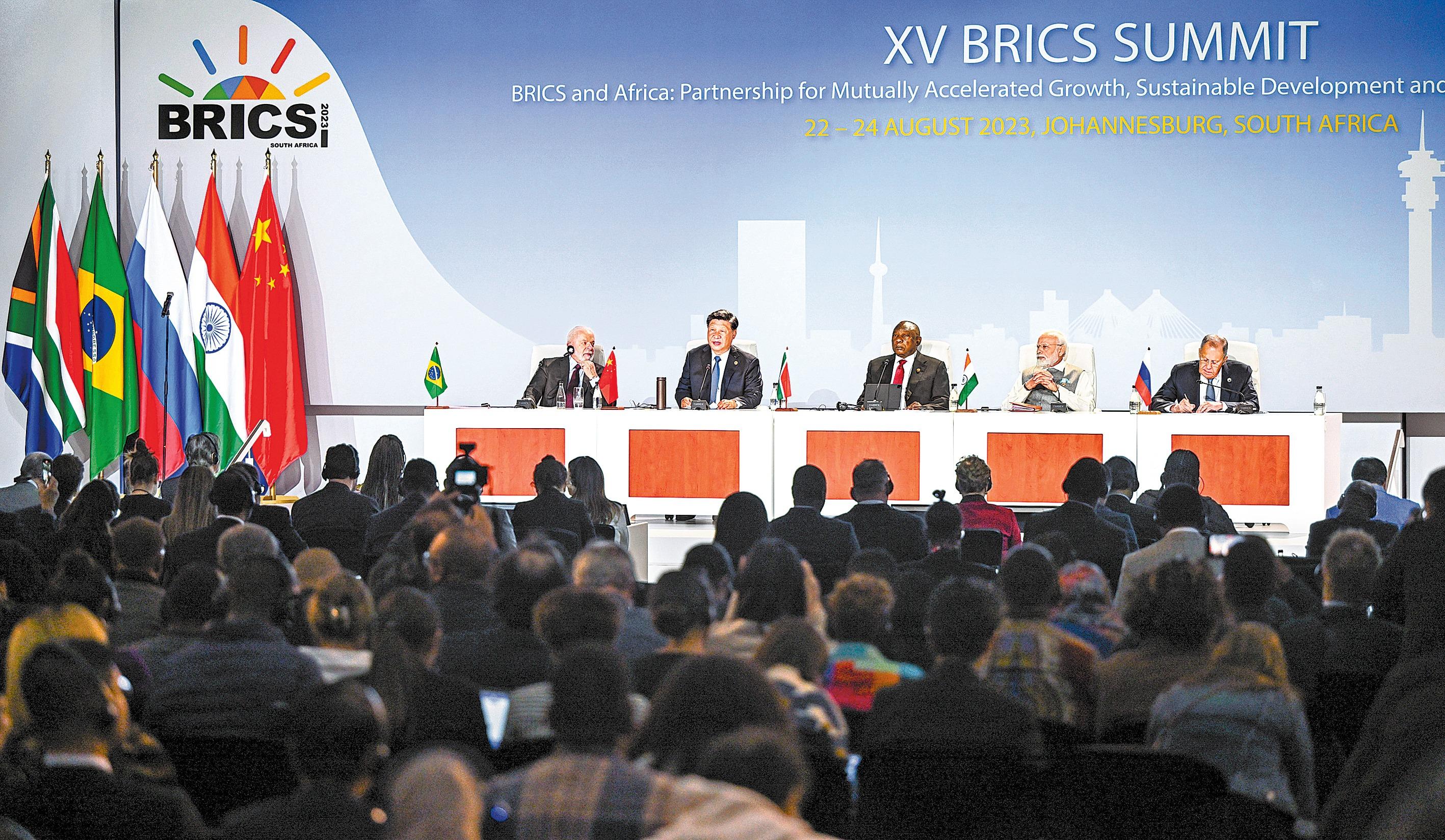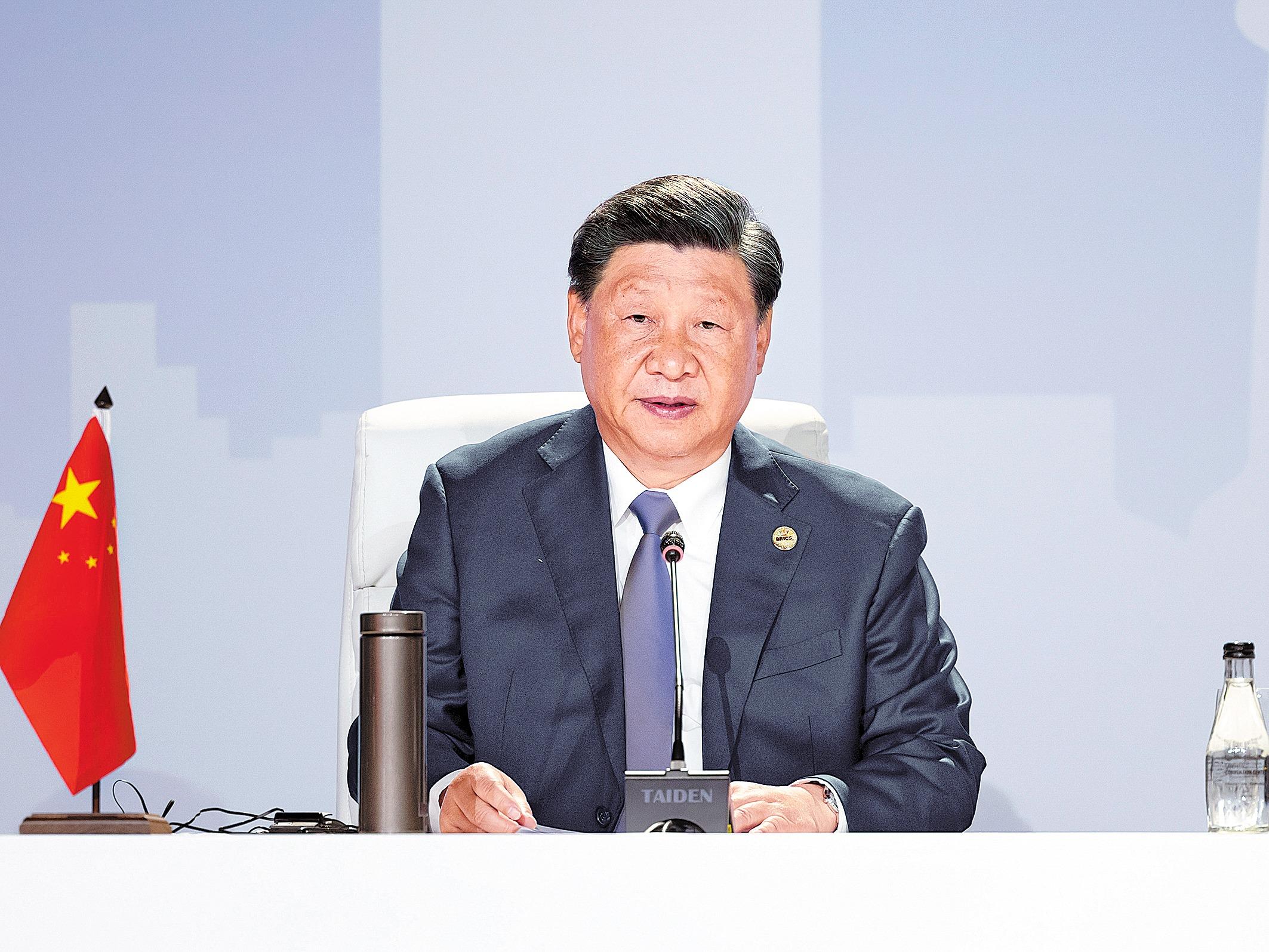Analysts welcome six new members as antidote to conflict and sign of group’s strength, togetherness
 Xi (second from left) and other leaders of BRICS countries at the news conference. (PHOTO / XINHUA)
Xi (second from left) and other leaders of BRICS countries at the news conference. (PHOTO / XINHUA)
President Xi Jinping hailed on Aug 24 the “historic” expansion of BRICS, the group of leading emerging economies, to include six new members, saying that the move marks a new starting point for BRICS cooperation and will provide fresh momentum for the mechanism.
Argentina, Egypt, Ethiopia, Iran, Saudi Arabia and the United Arab Emirates were invited to become new BRICS members.
The decision, which was also hailed by experts and analysts, was announced at a special news conference during the 15th BRICS Summit in Johannesburg, South Africa. The membership will take effect on Jan 1.
Speaking at the news conference, Xi said the expansion of the grouping — whose current members are Brazil, Russia, India, China and South Africa — speaks volumes for BRICS’ resolve to bolster solidarity and cooperation with other developing nations.
“It meets the expectations of the international community and serves the common interests of emerging markets and developing nations,” he said.
The expansion marks a new starting point for BRICS cooperation, Xi said, adding that it will inject new vitality into the mechanism of BRICS cooperation and further strengthen the forces of global peace and development.
“I believe that as long as we work together, there is great potential for BRICS cooperation, and the future of BRICS countries is promising. Let’s make joint efforts to write a new chapter of unity, cooperation, and development among emerging market countries and developing nations.”
Last year, BRICS started the expansion process during China’s chairmanship of the group, and China has since been working with other BRICS members to advance the expansion process, a spokesperson for China’s Foreign Ministry said on Aug 24.
Many emerging markets and developing countries have shown keen interest in joining BRICS, “and more than 20 countries submitted their applications, which speaks volumes about the appeal of BRICS and the enthusiasm and aspiration of emerging markets and developing countries for cooperation”, the spokesperson said.
The five member countries reached an agreement on the guiding principles, standards, criteria, and procedures for the BRICS expansion process, South African President Cyril Ramaphosa said at the news conference.
“We value the interests of other countries in building a partnership with BRICS. We have tasked our foreign ministers to further develop the BRICS partner country model and a list of prospective partner countries and report by the next summit,” Ramaphosa said.
The five leaders shared a vision for BRICS as a champion of the needs and concerns of the peoples of the developing Global South, including the need for beneficial economic growth, sustainable development, and reform of multilateral systems, he said.
“We reiterate our commitment to inclusive multilateralism and upholding international law, including the purposes and principles enshrined in the United Nations Charter,” Ramaphosa added.
The BRICS expansion was welcomed as a sign of the group’s strength by analysts from across the world.
Wang Lei, director of Beijing Normal University’s Center for BRICS Cooperation Studies, said the fact that the BRICS countries have reached consensus on the expansion of membership is a key indicator of mutual trust within the group.
“The joining of six new members will substantially elevate the strength of the grouping and enable it to play an increasingly important role in the global governance system,” Wang said.
The inclusion of the six additional countries in BRICS will help further demonstrate the solidarity among the Global South and demonstrate the BRICS spirit of openness, inclusiveness, and win-win cooperation, he said.
Wang added that the expansion of the group will enhance the representation of BRICS in the Middle East, Africa, and South America.
“The rise in the global representation of the grouping will help build up solidarity among developing nations and effectively improve the influence in various regions,” he said.
 President Xi Jinping speaks at a special news conference on new membership of BRICS, during the 15th BRICS Summit in Johannesburg, South Africa, on Aug 24.(PHOTO / XINHUA)
President Xi Jinping speaks at a special news conference on new membership of BRICS, during the 15th BRICS Summit in Johannesburg, South Africa, on Aug 24.(PHOTO / XINHUA)
Experts also hailed the entry of Middle Eastern countries into the BRICS bloc of developing nations, seeing it as bringing national shared interests closer together in a region long constrained by conflict.
With the long-term interests of Iran and Saudi Arabia expected to intertwine, BRICS could help secure stability in the region, create a balance in world energy markets, and improve regional and food security, they said.
“The most significant part in my opinion is that four of the six countries invited as full members are from the Middle East,” said Furkan Halit Yolcu, a researcher at Sakarya University Middle East Institute in Turkiye.
BRICS membership boosts the prestige of Egypt, Iran, Saudi Arabia, and the UAE, which are struggling under current US foreign policy, he said.
Mehmood Ul Hassan Khan, executive director of the Center for South Asia and International Studies in Islamabad, said the policymakers at the BRICS Summit in Johannesburg last week had achieved one of their biggest goals by inviting the six developing countries and signaling a “drastic change in global geopolitics and geoeconomics”.
Expanding BRICS will also improve regional and food security, he said.
The ministries of foreign affairs of Iran, Saudi Arabia and the UAE separately issued statements on being invited to join BRICS.
Iran’s Foreign Ministry said the country’s “great success in joining BRICS” will not only strengthen multilateralism but “can pave the way for pursuing the objectives of this administration”, and expand other grand strategies to implement Iran’s dynamic diplomacy.
Seyed Mostafa Khoshcheshm, former professor at the Iranian Foreign Ministry’s Faculty of International Relations, said the country’s accession to BRICS was a “setback for the United States” in its attempts to stifle the Islamic Republic.
“Iran is taking very wide jumps after joining the Shanghai Cooperation Organization, and now the BRICS group of countries, showing that the US push for isolating Iran has failed.”
On a larger scale, he said, this shows that “the world is changing now”, as has been acknowledged by Western intellectuals, politicians, and officials for the past two or three years. Global power, he said, was “on a transition from the West to the East”.
“On a different dimension, this will also have very positive outcomes for the West Asian states, for the Persian Gulf states. Iran and Saudi Arabia started a rapprochement with the help of the Chinese.”
In addition to China-brokered rapprochement and the enhancement of bilateral ties, Khoshcheshm said, relations between the two Middle Eastern powers will be more intimate under the BRICS grouping.
“When shared interests are intertwined and intermingled with each other, then there will be more stability and more security in the Persian Gulf region and for West Asia because the two (nations) can find more grounds for economic cooperation than hostility and rivalry.”
Saudi Arabia’s Minister of Foreign Affairs Prince Faisal bin Farhan said at the summit that the kingdom is the largest BRICS trading partner in the Middle East, with the value of its bilateral trade with the countries of the group exceeding $160 billion last year.
Prince Faisal expressed appreciation for the invitation extended by the BRICS group and said Riyadh would be studying it, adding that Saudi foreign policy focuses on building economic partnerships, according to a report by the newspaper Saudi Gazette.
The UAE Foreign Ministry said the country has been “a long-term partner of the BRICS group”.
The UAE Minister of Foreign Affairs Sheikh Abdullah bin Zayed Al Nahyan expressed his appreciation to the founding countries of BRICS and said the invitation marks recognition of the UAE’s commitment to promote constructive dialogue through active platforms that represent developing and emerging economies.
The UAE’s Minister of State for International Cooperation Reem Al Hashimy said the UAE recognizes BRICS “as a mechanism to promote global peace, stability and prosperity”.
Khan in Islamabad said the UAE has become the biggest country for the re-export of numerous goods and essential food items, a connecting hub for investment and innovation, and a bridge between the Gulf and Southeast Asia, the Middle East, and North Africa.
Given the overwhelming interest shown by many countries in joining BRICS, the success in building consensus in inviting as many as six new members is a reflection of both the bloc’s self-confidence in opening itself to new members just as it underlines its growing credibility, said Swaran Singh, professor of diplomacy and disarmament at Jawaharlal Nehru University in New Delhi, India.
What is even more interesting is how all five national leaders indicated this to be only a beginning and that many more aspirant nations are likely to be added to the bloc in coming years, Singh said. This has implications for most of the conventional post-World War II global governance structures that have failed to accommodate these emerging economies, he said.
Contact the writers at xuwei@chinadaily.com.cn



